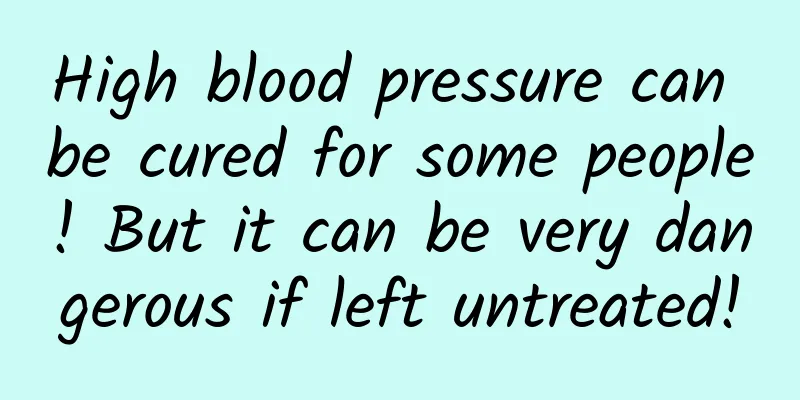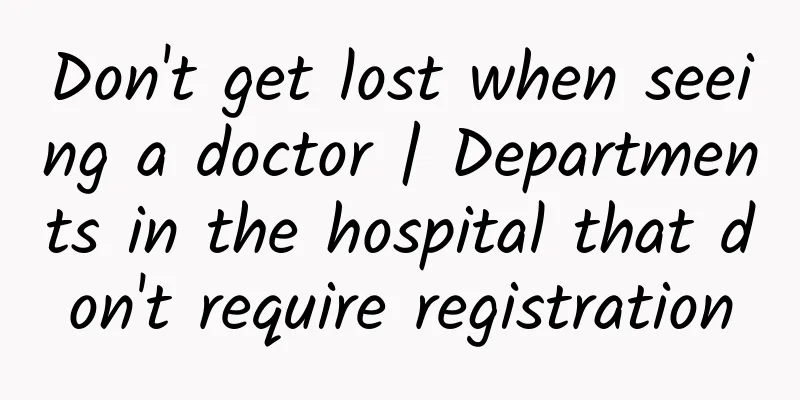High blood pressure can be cured for some people! But it can be very dangerous if left untreated!

|
This article was reviewed by Zhang Mingzhi, a postdoctoral fellow at the Fuwai Hospital of the Chinese Academy of Medical Sciences Doctor, my blood pressure was high today! What should I do? Is it high blood pressure? Neither of my parents has high blood pressure. Why do I have high blood pressure? Do I need to take medicine? Will I have to take medicine for the rest of my life? In the endocrinology department's hypertension clinic, doctors encounter this series of life-threatening questions almost every time. Hypertension is an important cause of cardiovascular and cerebrovascular diseases and death. In today's explosive epidemic, hypertension is familiar to everyone. However, many people still have many misunderstandings about high blood pressure. How is hypertension diagnosed? Hypertension in adults is defined as: systolic blood pressure greater than or equal to 140 mmHg and/or diastolic blood pressure greater than or equal to 90 mmHg when measured multiple times on different days. Try not to make a diagnosis on a single visit. Blood pressure reaching the above standards for at least 2 to 3 times indicates hypertension. If conditions permit, the diagnosis should be confirmed by monitoring blood pressure at home. The criteria for diagnosing hypertension by monitoring blood pressure at home are: 01 The average blood pressure measured at home is ≥135/85 mmHg; 02 24h ambulatory blood pressure monitoring, average blood pressure ≥130/80mmHg (main standard), daytime ambulatory blood pressure ≥135/85mmHg, nighttime ambulatory blood pressure ≥120/70mmHg. Do people with high blood pressure need to take medication for life once diagnosed? The answer is: NO! We cannot generalize. Hypertension can be primary or secondary. If the disease starts in middle-aged or elderly people, there is a family history of hypertension, and there are risk factors for hypertension such as obesity, diabetes, and hyperlipidemia, the possibility of primary hypertension is greater. Once diagnosed, if blood pressure is still not well controlled on the basis of improving lifestyle, antihypertensive treatment should be started early to prevent or delay the occurrence of hypertension-related complications such as cerebral stroke, angina pectoris or myocardial infarction, hypertensive nephropathy, and hypertensive eye disease. However, if hypertension is discovered and there are some special circumstances: young age (less than 35 years old), no family history of hypertension, hypertension combined with target organ damage (such as abnormal renal function, positive urine protein, visual impairment, stroke, angina pectoris, etc.), abnormal increase or decrease in kidney size, hypokalemia, adrenal mass, poor antihypertensive effect of drugs, etc., it is important to consider the possibility of secondary hypertension. What is secondary hypertension? Secondary hypertension refers to high blood pressure caused by specific causes, accounting for 5-10% of all hypertensive patients. If the true cause of high blood pressure can be identified and treated, some hypertension can be cured and controlled through surgery or special drugs. On the contrary, if the secondary causes are not discovered in time, blood pressure may continue to rise and become difficult to control, and these high blood pressures are more likely to cause damage to the functions of organs such as the heart, brain, and kidneys. Secondary hypertension mainly includes hypertension caused by endocrine diseases, hypertension caused by kidney disease (renal parenchymal and renal vascular), hypertension caused by obesity and respiratory diseases (obstructive sleep apnea syndrome), hypertension caused by drugs (such as hormones and licorice), and hereditary hypertension caused by some rare gene mutations. What are the symptoms of high blood pressure? Is it necessary to screen whether it is secondary? 1 Endocrine diseases lead to hypertension ● Incidentally discovered adrenal nodules, tumors, and enlargements. ● Hypokalemia and taking a small amount of diuretics (some antihypertensive drugs contain a small amount of diuretics) can cause hypokalemia. ● Blood pressure shows paroxysmal or persistent increase, accompanied by palpitations, sweating, headache, and pale (or red) face. ● Weight gain is accompanied by a rounding and redding of the face, thickening of fat in the back of the neck and abdomen, purple streaks on the abdomen/armpits/thighs, and bruises from minor bumps. ● Hypertension is accompanied by abnormal sexual development (unclear gender distinction, acne and hirsutism in women, dense body hair in men, short stature, large or small penis, undeveloped testicles or cryptorchidism). ● Symptoms of abnormal hormone secretion such as palpitations, sweating, and weight loss (hyperthyroidism), fatigue and fear of cold (hypothyroidism), abdominal distension and constipation, urinary stones (hyperparathyroidism), or enlarged hands and feet and facial changes (acromegaly). 2 Kidney disease causes high blood pressure ● Hypertension combined with hematuria, proteinuria, and abnormal renal function. ● Young (<35 years old), acute increase in blood pressure, acute increase in hypertension and organ damage (such as visual impairment, kidney damage, angina pectoris, stroke, etc.). ● Poor antihypertensive effect, such as the rapid decline in renal function after treatment with angiotensin receptor antagonists (…sartan)/angiotensin II inhibitors (…pril) and diuretics (…thiazide). ● Hypertension combined with bilateral kidney size discrepancy and hypokalemia. Sleep apnea causes high blood pressure ● Combined with obstructive sleep apnea syndrome, such as obesity, snoring at night, apnea, poor sleep quality, daytime sleepiness, dry mouth in the morning, etc. 4 Drugs cause high blood pressure ● Such as glucocorticoids, cyclosporine, nonsteroidal anti-inflammatory drugs, etc. Hypertension does increase after the use of certain drugs. In short, although secondary hypertension is far less serious than primary hypertension, the harm it causes (mainly target organ damage) is far greater than primary hypertension! Moreover, secondary hypertension can often be cured or controlled through surgery or special medications after the cause is identified. If it is not diagnosed and treated in time, the chance of curing hypertension is often lost. Therefore, after confirming the diagnosis of hypertension, you can first check yourself to see if you have the above-mentioned suspicious clinical clues. If so, go to a specialized hypertension clinic as soon as possible to determine whether it is secondary hypertension. Source: Run Run Shaw Hospital (ID:srrsh199405) This article has been authorized. Please contact the original author for reprinting. The pictures in this article with the "Science Popularization China" watermark are all from the copyright gallery. The pictures are not authorized for reprinting. |
>>: What should I do if I have diarrhea after drinking milk? Can I train my milk intake?
Recommend
Why does marketing to women so often fail?
Since entering the 21st century, the rise of fema...
The "assembly call" for migratory birds has been sounded again! How do they fly across mountains and seas?
Science Times reporter Ji Chunhong The seasonal c...
When the air-conditioning industry encounters turmoil, should it engage in a price war or a quality war?
Here, several competing domestic mobile phone man...
Where does the energy for upgrading human civilization come from? Do we need to build a Dyson sphere?
This article is based on answering questions from...
Instead of opposing beautification, software manufacturers should focus on mosaic removal
Everyone has a love for beauty. During the Spring...
Who is the prototype of the sandworm in "Dune"? The Mongolian death worm should have a name
The movie "Dune" was released not long ...
Product Analysis Report丨How does WeChat Reading retain users?
I have always believed that reading is a solitary...
The Ultimate Method of Strategic Planning
Over the past year or so, I have been very fortun...
KOL Marketing: Xiaohongshu’s High-Quality Short Video Influencer Screening Guide
At present, short videos, as a dark horse in traf...
Creativity | A comprehensive review of Christmas marketing strategies!
In a blink of an eye, 2019 is almost over. At the...
How to make it difficult for users to refuse "Inviting users to review"?
The feature of "invite users to review"...
KDJ comprehensive interpretation 7 video lessons
KDJ comprehensive interpretation of 7 video lesso...
Yan Hu's Mandala Painting Theory + Practical Painting Psychology Video Course 26 Lectures on Emotional Regulation and Self-Growth
Yan Hu's Mandala Painting Theory + Practical ...
Brand live streaming sales strategy!
From November 15th to 16th, L'Oreal was on th...









